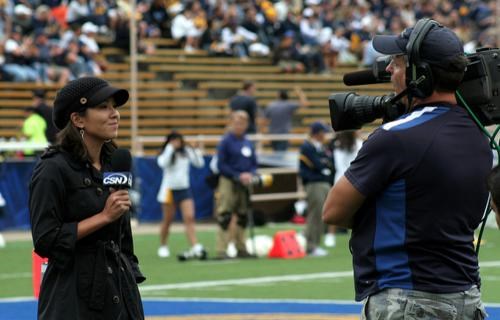Female sports reporters start anti-harassment campaign
During an important football match held on March 25 in Rio de Janeiro's Maracana stadium, a campaign was launched through a powerful video shared on Twitter. The video contains statements from female reporters who have been harassed and assaulted while doing their job. In total, 52 female sports reporters are part of the group.
The idea behind the video is to raise awareness on the topic of all types of offences experienced by female sports reporters daily. The hashtag used to spread the video in the different social media is #deixaelatrabalhar, or #LetHerDoHerJob in English, and calls for respect for the professional work carried out by the female reporters. Indeed, as seen in the video, there is a high number of disrespectful episodes of harassment, such as a man forcibly kissing the reporter Bruna Dealtry after she asks him a question.
"We figured out that most of us had the same story. Every single day we have to handle the jokes, the comments, even the decisions that sometimes are not taking based on meritocracy, but with a little bit of sexism. It's important that we feel safe in stadiums, working with sports fans' support, and we want more legal support about it," declared Bibiana Bolson, one of the women part of the #deixaelatrabalhar campaign, in an interview with BuzzFeed News.
The group of Brazilian female sports reporters who initiated the campaign had a clear purpose in mind: educating fans to respect them in the course of their work and preventing the repetition of sexual harassment acts. "We are women and we are professionals, we just want to work in peace. Sport is our place too,” some of the female sports reporters stated firmly in the video.
The past years there has been a growing attention to discriminatory behavior at stadiums, and reporters involved in the #LetHerWork campaign wish to bring gender-based crimes to the prosecutors’ attention, says Gabriela Moreira, a reporter with ESPN, according to the Committee to Protect Journalsts.
"We need to make prosecutors more aware and they need to tell police inside the stadium to take action when offences are committed against women."
The hope is that those voices will be heard and that a proactive behavior in changing this kind of culture present at the workplace as well as at the sport venues will be adopted. According to the freelance journalist Mayra Siqueira, the reactions to the video were quite positive. "I was pleasantly surprised by the response we got. A lot of people retweeted our post, including some of the football clubs and male fans," she told to CNN.
Those type of incidents are not new nor are they confined to Brazil; in October 2017 a broader campaign was launched using the hashtag #Metoo and aiming to encourage women to speak up about their stories of sexual harassment.
Watch the campaign video here:






